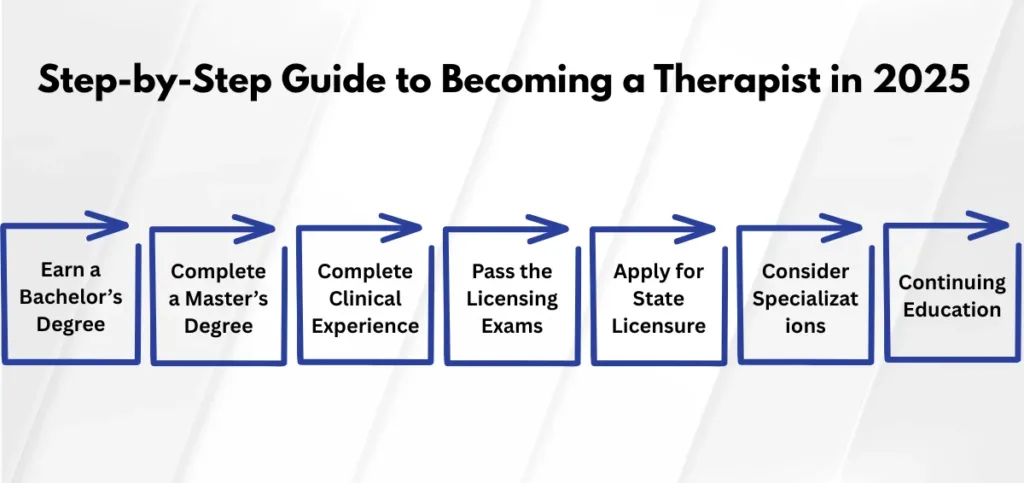
Therapy is a gratifying profession that allows you to help improve someone’s mental and overall well-being. The U.S. Bureau of Statistics has projected a 22% growth in the demand for mental health counselors from 2021 to 2031, with an expected 43,000 new job positions opening up.
Suppose you like psychology and possess the communication skills and empathy to understand someone’s problems. And if you can guide them to a mental state where they can better handle those problems, then this might be the right path for you. Now that you know that becoming a therapist is something you want to pursue, the question becomes, how do you go about it? Here’s a step-by-step guide to becoming a licensed therapist in the United States.
Step-by-Step Guide to Becoming a Therapist in 2025

Step 1: Earn a Bachelor’s Degree
Getting a bachelor’s degree is the first step toward becoming a therapist. While a psychology major does provide you with a better understanding of the subject, it isn’t mandatory. Most aspiring therapists opt to have a degree in social work, human development, or any related field. Choosing a relevant field helps prepare you for advanced coursework and clinical training.
Step 2: Complete a Master’s Degree in Counseling or a Related Field
A Master’s degree in counseling is a graduate-level program designed to prepare students for professional licensure and clinical practice. Degrees such as an M.A. or M.S. in counseling, clinical mental health counseling, marriage and family therapy, or social work are essential for becoming a licensed therapist in the U.S. To be admitted into these programs, you must have a bachelor’s degree and a minimum GPA of 3.0. Some programs accept candidates with lower GPAs based on personal statements, recommendations, and relevant experience. While a psychology major isn’t mandatory, applicants without a psychology background may be required to complete prerequisite coursework in General Psychology, Developmental Psychology, or Research Methods.
Most of these programs span from 2 to 3 years and include a mix of coursework, supervised practicums, and clinical internships totaling around 600-1000 hours of hands-on experience. The coursework in these programs covers counseling theories, ethics, human development, multicultural counseling, psychopathology, and assessment techniques. Some of the highly regarded universities offering a CACREP-accredited master’s program in counseling and therapy are:
- Northwestern University
- University of Southwestern California
- New York University
- Vanderbilt University
- University of Florida
These are just some of the universities that offer a master’s program in counseling and therapy, which can help you start your career as a clinical practitioner.
Read Also: Brainspotting vs EMDR
Step 3: Complete Clinical Experience Requirements
To become a clinical therapist in the U.S., one needs to acquire clinical experience in their career in two stages of their journey towards becoming a therapist. The First is during the master’s program, and the second is post-graduation under supervision. Both stages are essential to acquiring a license to practice professionally.
Stage 1 – Clinical experience during your Master’s program
This includes your practicum or an internship and is a mandatory requirement for all CACREP-accredited programs. Here’s an overview of what is expected of the candidate:
Practicum
1. Hours: Requires 100 to 150 hours (According to CACREP standards).
2. Supervision: 1 hour of individual or triadic supervision per week.
3. Purpose: Initial experience in a real clinical setting, like a school, clinic, or a hospital, under supervision.
4. Activities: Observing how sessions are conducted, conducting intake interviews, and writing clinical notes.
Internship
1. Hours: At least 600 hours are required; some programs may require more, ranging from 700 to 1000 hours.
2. Supervision: 1 hour per week of individual supervision and 1.5 hours per week of group supervision.
3. Purpose: To provide an intensive, real-time experience seeing clients.
4. Activities: Conduct therapy sessions and assessments, and document cases.
Stage 2 – Supervised clinical experience post-graduation.
After graduation, you must still complete additional supervised hours to qualify for state licensure. Based on the type of License, a candidate must complete an extra 1500 to 4000 hours of supervised hours within 1 to 2 years. A state-approved licensed clinician usually does the supervision. Some states count hours per week, while others total them over the years. You must document all the hours and submit them to a licensing board during this period.
To start a fully licensed independent practice, meeting the clinical experience requirements is mandatory.
Step 4: Pass the Licensing Exams
To become a licensed therapist or a counselor in the U.S., you must pass one or more licensing exams. This will also depend on the type of degree and license you pursue. Licensing requirements for becoming a professional practicing counselor in the U.S. vary from state to state.
National Counselor Examination (NCE) – Licensed professional counselors or licensed mental health counselors must clear this exam. The National Board for Certified Counselors (NBCC) administers the examination and primarily focuses on counseling theories, ethics, human growth, assessment, group work, and career development. The cost of taking this examination will be around 275 to 350 USD. States like Alabama, Colorado, and Delaware are a few among many that require a candidate to pass this exam to get a license to become a practicing counselor or a therapist.
National Clinical Mental Health Counseling Examination (NCMHCE) – Some states in the U.S., like Florida, Massachusetts, Mississippi, and New Hampshire, to name a few, require a candidate to clear this exam instead of the National Counselor Examination (NCE) to get a license for a clinical practice. NBCC also administers this exam and focuses on Clinical assessment, treatment planning, Intake, and crisis intervention. The cost of this examination is 275 to 350 USD.
Examination for professional psychology practice (EP)—This examination is conducted for a licensed psychologist(Ph.D. or Psy.D. level) and is administered by the Association of State and Provincial Psychology Boards (ASPPB). The exam primarily focuses on Psychological assessment, intervention, ethics, research, and clinical skills. It costs 600 to 800 USD. This exam is mandatory; all aspiring psychologists must pass it to get their licensure across all U.S. states.
Step 5: Apply for State Licensure
After clearing all the mandatory exams to obtain a practicing license, you can submit a licensure application to your state’s board of professional counselors, social workers, and psychologists with all the required documents. These are :
- A completed application form is available on your state board’s website.
- Proof of education with official transcripts.
- Exam scores are sent directly from the Administering authority.
- Verification of supervised experience.
- The application is 100 to 400 USD, depending on the state.
- Background check, which would include fingerprints and a criminal history check.
Read Also: Who is Not a Good Candidate for Ketamine Infusion Therapy?
Step 6: Consider Specializations and Certifications
Congratulations! You are now a practicing therapist. However, as a therapist progresses, you must consider specializing based on your interest or the client’s needs. Specialization can deepen your expertise, increase your professional opportunities, and enable you to help your clients get the desired better outcomes. Some of the common specializations are:
- Marriage and Family Therapy.
- Substance Abuse Counseling.
- Child and Adolescent Therapy.
- Trauma and Crisis Counseling.
- Grief Counseling.
- Cognitive Behavioural Therapy (CBT).
- Dialectical Behaviour Therapy (DBT)
While it is not always mandatory, certifications from recognized bodies can enhance your credentials. This can help convey advanced competence to your clients and assure them that you can assist them in getting better outcomes. Specialization and Certification also allow you to increase your earning potential.
Step 7: Maintain Licensure Through Continuing Education
Earning your License is just the beginning of your journey as a professional therapist. Maintaining it requires ongoing professional development. Most U.S. states mandate that licensed therapists complete a set number of Continuing Education (CE) hours every renewal period (typically every 1 to 2 years).
These Continuing Education hours often include mandatory topics like ethics, suicide prevention, and cultural competency. You can earn CE credits through accredited workshops, online courses, university programs, or professional conferences. Apart from fulfilling legal requirements, continuing education helps you refine your skills, stay updated with the latest research and clinical practices, and ultimately provide your clients with more effective and ethical care.
Optional Step: Pursue a Doctoral Degree
While a doctoral degree is not required for most counseling or therapy roles, pursuing a PhD in Psychology or a Psy.D.(Doctor of Psychology) can open doors to advanced career opportunities. A doctoral program typically takes 4 to 7 years to complete and is ideal for those interested in clinical supervision, academic teaching, high-level research, or private practice with a specialization.
These degrees offer in-depth training in psychological assessment and evidence-based interventions, often including a dissertation or capstone project. Earning a doctorate also qualifies you for licensure as a licensed psychologist, which differs from other therapy licenses and may be required for specific clinical or institutional roles. Even though it is a significant investment of time and resources, a doctoral degree can greatly enhance your expertise, authority, and earning potential.
Frequently Asked Questions
How many years does it take to become a therapist?
The number of years it takes varies depending on the type of License you pursue, but you will be a therapist in 6 to 10 years from the start of your bachelor’s degree.
What is the qualification for a therapist?
The qualifications to become a licensed therapist in the U.S. vary from state to state. However, the basic requirement is a four-year degree in psychology, social work, human services, or a related field.
How do you start as a therapist?
You can start your career as a therapist through private practices, clinics, hospitals, schools, or non-profits. Most of the time, newly licensed therapists start in an agency setting or group practice to get the ball rolling.










